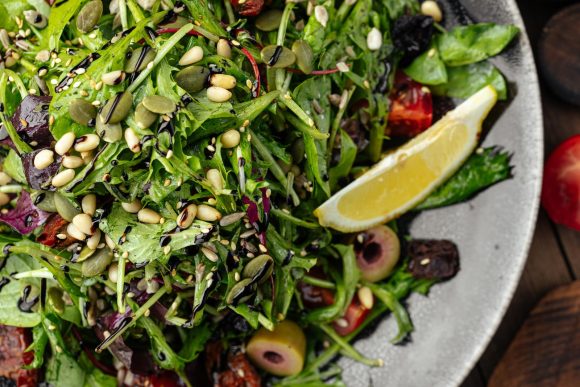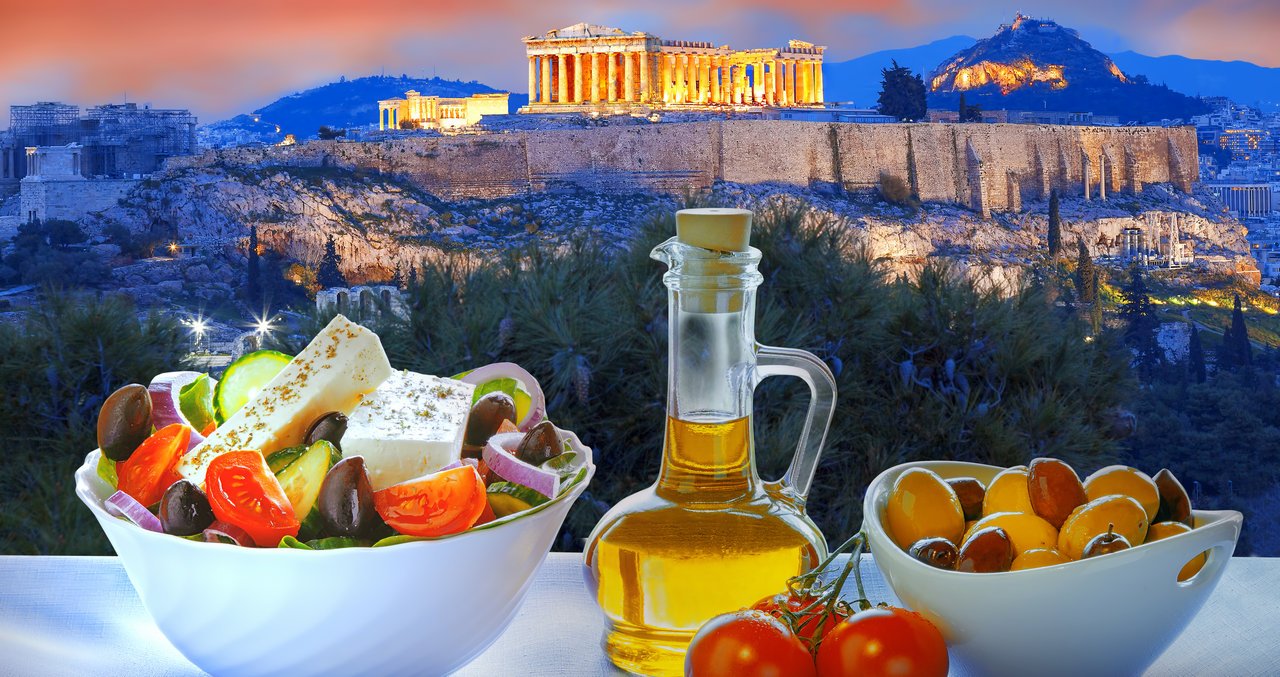The Ancient Greek Origins of the Mediterranean Diet
The connection between the ancient Greek diet and modern Mediterranean cooking
The Mediterranean diet has gained popularity worldwide due to its numerous health benefits. But did you know that this diet was actually invented by the ancient Greeks? The connection between the ancient Greek diet and modern Mediterranean cooking is intriguing, as it reveals the enduring influence of the ancient Greeks on our culinary practices.
The ancient Greek diet was not only a means of sustenance but also a way to maintain good health. Ancient Greek doctors, including Galen of Pergamon, played a significant role in pioneering the Mediterranean diet. They believed that food could be used as a form of medicine to maintain good health. Galen and other doctors of the time emphasized the importance of simple, flavorful food for their patients. Their food recipes often included ingredients like garlic, onions, and spices such as ginger and pepper. They believed that the flavor of a food was an indicator of its nutritional value. This belief laid the foundation for the principles of the Mediterranean diet.
Ancient Greek Doctors and the Invention of the Mediterranean Diet
The ancient Greek Mediterranean diet was not just a casual approach to eating; it had a scientific basis. Ancient Greek doctors were known for their holistic approach to medicine, and diet played a crucial role in their treatments. They believed that the food people consumed could either promote health or lead to illness. Galen, one of the most prominent ancient Greek physicians, emphasized the importance of a balanced diet in maintaining overall well-being. He believed that food could be used to prevent and treat diseases, and he prescribed specific dietary guidelines to his patients.
To illustrate the significance of ancient Greek doctors’ influence on the Mediterranean diet, let’s take the example of garlic. Garlic was not only used as a flavor enhancer in ancient Greek cuisine but also for its medicinal properties. Galen recommended garlic to his patients for its antimicrobial and anti-inflammatory effects. This ancient Greek belief in the health benefits of garlic has persisted to this day, and garlic continues to be a staple ingredient in Mediterranean dishes.
Principles of the Ancient Greek Mediterranean Diet
The ancient Greek Mediterranean diet was primarily plant-based, with a focus on vegetables, fruits, and olive oil. Meat and dairy consumption were limited in the ancient Greek diet. The diet emphasized the use of regional plants over imported luxuries. Simple cooking techniques, such as grilling and steaming, were utilized to bring out the flavors of basic ingredients. Spices such as pepper, ginger, and cinnamon were recommended by ancient Greek doctors for their health benefits and flavor-enhancing properties. The ancient Greeks believed that the combination of rich flavors and nutritional potency was essential for maintaining good health.
The ancient Greek diet was based on simple foods
The ancient Greek diet was based on simple foods, and they did not consider extravagant and rich meals a good thing.
- The three main staples of the Greek diet were wheat, oil, and wine.
- Legumes were also essential to the Greek diet and were harvested in the Mediterranean region since prehistoric times. Lentils were the earliest and most common legume.
- The Greeks ate a lot of bread, which they dipped in wine or olive oil.
- They also ate a lot of vegetables such as cucumbers, beans, onions, chickpeas, broad beans, and figs.
- For protein, they ate fish, pork, and veal, while they rarely ate goat or lamb.
- Red meat was reserved for the wealthy, as it was more difficult to obtain than fish from the sea.
- They ate three meals a day: breakfast, lunch, and dinner. Dinner was the most important meal and was where most of the food was consumed. For dinner, the ancient Greeks ate eggs (from quail and chickens), fish, legumes, olives, cheese, bread, figs, and whatever vegetables they could grow and were in season.
- Dessert was not a daily occurrence in ancient Greece, and was eaten only occasionally. As for sweets, honey was the main sweetener and things like cheese drizzled with honey or figs and olives with honey were the most common type of dessert.
- Every meal was accompanied by watered wine and olive oil was always on the table.
The Greek playwright Antiphanes (circa 404–330 BC) nicknamed the Greeks “leaf chewers”, to emphasize their very rich diet in vegetables. According to the Orphic and Pythagorean teachings, meat was rarely consumed (also because it was expensive), while fish was more popular than meat. Source.

An example of a plant-based dish from the ancient Greek Mediterranean diet is “dolmades,” which are stuffed grape leaves. This dish is made by wrapping a mixture of rice, herbs, and spices in grape leaves and then steaming or baking them. The use of regional ingredients and simple cooking techniques in this dish exemplifies the principles of the ancient Greek Mediterranean diet.
Connection to Modern Mediterranean Cooking
The principles of the ancient Greek Mediterranean diet have had a lasting influence on modern Mediterranean cooking. One of the key ingredients that bridges the ancient and modern diet is olive oil. Olive oil is not only a staple in both ancient and modern Mediterranean cuisines, but it also plays a significant role in both flavor and health benefits.
Modern Mediterranean cooking has shifted towards more plant-based meals, aligning with the emphasis on vegetables and fruits in the ancient Greek diet. This shift reflects a growing understanding of the health benefits associated with plant-based eating. In modern Mediterranean cuisine, dishes like Greek salad, which includes a variety of fresh vegetables, feta cheese, and a generous drizzle of olive oil, showcase the influence of the ancient Greek Mediterranean diet.
Health Benefits and Popularity of the Mediterranean Diet
The Mediterranean diet is widely recognized as one of the healthiest diets globally. Scientific studies have shown that following the Mediterranean diet can have numerous health benefits. It has been proven to reduce the risk of cardiovascular diseases, metabolic syndrome, obesity, type 2 diabetes, cancer, and neurodegenerative diseases.
The health benefits of the Mediterranean diet can be attributed to its emphasis on whole, unprocessed foods, and the inclusion of healthy fats, such as olive oil and nuts. These dietary factors contribute to lower inflammation levels, improved heart health, and better overall well-being. The Mediterranean diet is also rich in antioxidants, vitamins, and minerals, which play a crucial role in supporting the immune system and preventing chronic diseases.
Due to its cultural and health-related significance, the Mediterranean diet has been designated as an “Intangible Cultural Heritage of Urgent Safeguarding” by UNESCO. This recognition highlights the importance of preserving and promoting this diet for future generations.
Mediterranean Diet as a Sustainable and Environmentally Friendly Eating Pattern
The Mediterranean diet is not only beneficial for personal health but also for the planet. For instance, the Mediterranean diet encourages the consumption of fruits, vegetables, whole grains, nuts, and legumes, which are all plant-based foods. These foods have a lower environmental impact compared to animal-based foods, as they require fewer resources to produce.
Additionally, the Mediterranean diet promotes the use of local and seasonal ingredients, reducing the need for long-distance transportation and supporting local farmers. Finally, the diet emphasizes mindful eating and portion control, reducing food waste and promoting a more sustainable approach to food consumption.
Threats and Preservation of the Mediterranean Diet
Despite its popularity, the Mediterranean diet is at risk of being extinguished in its homeland territories. Globalization, lifestyle changes, and economic factors pose threats to the traditional Mediterranean diet. The convenience of processed foods and the influence of Western eating patterns have led to a decline in the consumption of traditional Mediterranean foods in some Mediterranean countries.
Efforts are needed to promote and preserve this diet to benefit from its health-promoting properties and cultural significance. Education about the health benefits of the Mediterranean diet and the importance of preserving traditional culinary practices is crucial. Additionally, initiatives that support local farmers and encourage the consumption of regional, seasonal foods can help safeguard the Mediterranean diet.
Conclusion
The Mediterranean diet, invented by the ancient Greeks, has stood the test of time and remains popular today due to its health benefits. The principles of the ancient Greek Mediterranean diet, such as the emphasis on plant-based foods, regional ingredients, and simple cooking techniques, have had a lasting influence on modern Mediterranean cooking. Preserving and promoting the Mediterranean diet is crucial to safeguard its cultural and health-related significance. By incorporating the principles of the ancient Greek Mediterranean diet into our modern lifestyles, we can enjoy the health benefits and culinary delights of this timeless cuisine.







